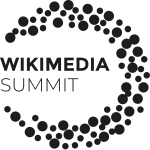Wikimedia Summit 2022/Event-report
| Overview | Outcome and evaluation | Lessons learned | Financial Report |
Overview
[edit]- Overview
Hybrid conference held simultaneously in Berlin (Bildung- und Kulturzentrum Peter Edel) and online via our event platform.
- Duration
3 days (September 9-11, 2022). All sessions took place between 10:00 CEST and 19:00 CEST (working hours for technical and security staff in Berlin).
- Main goal
The Wikimedia Summit is the place for Affiliates and the Wikimedia Foundation to come together to discuss and shape the future of the Wikimedia Movement. The 2022 event was designed around the implementation of the 2030 Movement Strategy. The goal of the event was to advance the governance reform of the Wikimedia Movement, aligned with the ongoing drafting process of the Movement Charter, and to better connect the global, regional, and local implementation of Movement Strategy programmatic initiatives.
- Main target audience
This year’s Summit was open to affiliate representatives selected through an application process, movement committees (AffCom and Movement Charter Drafting Committee) as well as members of the Wikimedia Foundation (board and staff).
- Organizers
The Wikimedia Summit was hosted and organized by Wikimedia Deutschland with the financial support of the Wikimedia Foundation. The Foundation also played an important role in program design and event support. The program team was composed of three people from the two organizations. Planning and execution of event logistics were managed by Wikimedia Deutschland in collaboration with an external event agency (KWERTZ GmbH, Berlin).
- Conference team
- Project lead: Maiken Hagemeister (WMDE), Nicole Ebber (WMDE)
- Organizing team: Eva Martin (WMDE), Louisa Meyer (WMDE), Cornelius Kibelka (WMF)
- Program team: Nikki Zeuner (WMDE), Kaarel Vaidla (WMF), Hanan El-Youssef (WMF)
- Facilitation & documentation team: Bhavesh Patel, Rob Lancaster, Luis Manuel Pinto, Olha Kostka, Naomi Martin, Abbad Diraneyya (WMF)
- Tools used
A virtual event platform was created, which served from early on as the central space for all communication with participants in the months leading up to the event. The platform was developed and run by the event agency, including adapting it to the Wikimedia Summit’s needs. The online platform was hosted on https://www.vistream.online/ and fully GDPR compliant.
The platform was used for participant management (travel information, support chat), pre-engagement (onboarding materials, group chat) as well as for hosting the virtual event component of the Summit (breakout sessions and live stream of the main room).
The following tools where used for the conference and embedded into the platform:
- BigBlueButtons (video conference software) for the breakout sessions
- Jitsi (live stream in of the main room)
- A Google Doc Diary with live updates on the conference program and summary of previous sessions.
Additionally, Baserow was used on the first day of the program to collect data on implementation initiatives and enable collaboration among affiliates.
- Communications
Aside from the event platform, usual ways of communications were used: A dedicated page for the Wikimedia Summit on Meta wiki provided information on the event, and an own Telegram channel for the Summit was made available for communication with and among participants.
- Language(s) spoken during the event
The conference’s working language was English. Onboarding material was provided mainly in English with translations available for some documents. No live interpretation was offered.
- Participant feedback survey
A feedback survey was sent to all participants on the last day of the event. The results can be found in this slide-deck.
Logistics
[edit]Overall, planning, organization, and execution of all logistics around the Wikimedia Summit were shaped by a variety of challenges and a huge degree of complexity due to the event’s hybrid nature. The Wikimedia Summit was the first hybrid event of the Wikimedia movement, as well as the first event that involved an external event agency to such a degree.
Event logistics were managed by Wikimedia Deutschland’s event team in collaboration with an external event agency, and consisted of, among others, finding a suitable venue, booking travel and accommodation for most participants, and managing participant communication.
All communication was channeled through the event platform that was created specifically for the Wikimedia Summit 2022. The platform contained all logistical information for participants and offered them the possibility to upload documents necessary for their travel and participation. Two people dedicated to answering questions on the chat support took care of all requests the participants had. In total, we received 2.878 messages from the participants on the support chat and sent 12.242 messages, including help chat support and email notifications.
We were lucky enough to find a location that met our needs in terms of capacity and collaboration spaces. However, hotels in the direct whereabouts of the event location were already booked out when event planning had started. This led us to choose a hotel whose location wasn’t ideal for the participants. Furthermore, we had to resort to two different hotels, as it was not possible to find one hotel with enough rooms for all participants.
Besides organizing the Wikimedia Summit, WMDE and our event agency supported several side events like the MCDC, the affiliates’ Executive Directors, the WMF Board of Trustees and the WMF Product & Tech meeting.
The Foundation travel team organized travels for WMF staff, board and committee members. WMDE acted as an intermediary between the participants, the Foundation and the event agency. We sent a conference guide
WMDE tried to support the visa application process by providing additional documents for participants, by reaching out to the German Federal Foreign Office and to embassies in several countries on behalf of participants who couldn’t get a visa appointment on time for the Summit. While this was successful in some cases, unfortunately it did not work for all of the affected participants. We will continue to examine possible ways to support future visa processes.
WMDE’s finance team organized cash reimbursements on-site for participants who had expenses for visa or travel related costs.
The participants' survey emphasized that the logistical aspects of the Summit were organized to the majority satisfaction of the participants.
Program
[edit]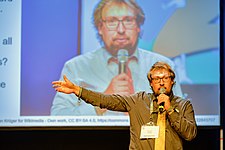
Building upon the input from the participants’ applications, and taking into account the progress and needs of the implementation of programmatic initiatives and the governance reform, the purpose and desired outcomes of the Summit have been created.
Wikimedia Deutschland’s Movement Strategy & Global Relations team worked closely with members of the Wikimedia Foundation Movement Strategy & Governance team on the program. Due to the short planning time, we did not manage to involve more affiliates in the process, but highly recommend doing so in the future. The program team consisted of Nikki Zeuner (WMDE), Kaarel Vaidla (WMF) and Hanan El-Youssef (WMF) and was supported by a facilitation and documentation team around Bhavesh Patel whom we had worked with for several years and Summits before.
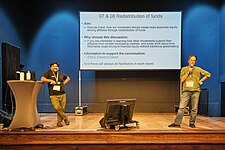
The Summit was designed to serve as a working meeting with room for facilitated discussions, and also provided a space for connecting, celebrating, learning, and planning for the future. A one-track program was created and there were hardly any frontal presentations, but multiple breakout rooms to get to work together. That means, participants did not just attend and listen, but were actually participating and engaging with their peers from the movement.
As it was the first time since Wikimania 2019 that affiliates were able to get together in person, we made sure to leave a lot of room for informal conversations (long breaks, not starting before 10am, not ending after 6pm).
The program and facilitation teams met in Berlin in June and during the week before the Summit to create the program outline and the final schedule.
- Day 1 was focused on warm-up, exchange and implementation of programmatic initiatives.
- Day 2 was built around the governance reform (Global Charter, revenue and resources, hubs)
- Day 3 was an open space to either continue conversations from Day 1+2 or to surface topics that hadn’t made it to the agenda. It ended with a comprehensive summary of the event and an outlook of what’s next.
A full report on each conference session can be found here.
Conclusion
[edit]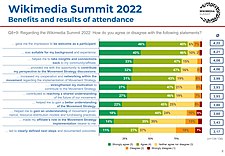
Despite a series of logistical and program-related obstacles, the Wikimedia Summit 2022 was a successful event, rated very positively by the participants (85% of the participants evaluated the conference as “good” or even “very good”). As in the previous Wikimedia Summit, ‘Networking and Meeting people’ is the most often stated benefit of the Summit for participants. Considering the challenges of hybridity, organizers were very glad to see the positive rating of the online tools and overall feeling of inclusion of online participants.
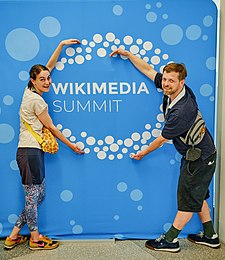
Wikimedia Deutschland would like to thank everyone who contributed to the success of this event. We are glad to have used this opportunity to collect valuable data around implementation initiatives and hope that this work will help identify and start new collaborations in the future. The conversations started around hubs, governance and fundings should continue beyond the Summit: in local, regional and global events as well as on meta and on the MS Forum. We will closely follow the work of the Movement Charter Drafting Committee and are eager to see how they will include the feedback collected during the Summit into the Charter.
In the spirit of peer support, Wikimedia Deutschland would be happy to exchange with other event organizers on how to run hybrid events if need be. If you wish to contact us, please send us an email at wmsummit@wikimedia.de.

